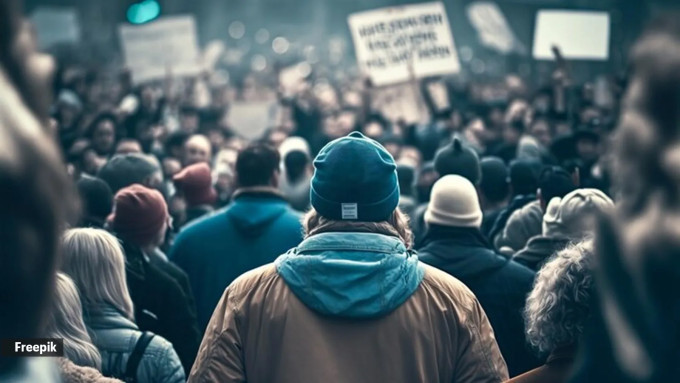New study suggests that being ‘woke’ can lead to depression. The reality is far more complex
We are going through tumultous times. Wars. Death. Destruction. Rampant racism. The persisting gender gap. Oppression of minorites. The list is endless. Not only this, but the globe also collectively beat a Covid-19 induced pandemic. Now, that new research indicates that there are certain negatives to being highly engaged in critical discourse around social justice, there is a renewed discussion surrounding it.
Being ‘woke’ — oftentimes used as insult for those individuals who are progressive in their political leanings — according to a new study might lead to increased feelings of anxiety and depression.

While the term ‘woke’ originated in African American Vernacular English (AAVE), having roots in African American culture and activism, its historical connotations have evolved over time. Initially, ‘wokeness’ was associated with those actively involved in racial justice and fighting inequality, however. This premise still holds true but being ‘woke’ in this day and age, is a derogatory comment passed for those who are socially and politically conscious, advocating for social justice.
Now, new research from done by a Finnish academic in the Scandinavian Journal of Psychology shows interesting findings. According to the study, a stronger alignment with pro-social justice stances correlates greatly with increased instances of both anxiety and depression.
The study suggests that the emergence of critical social justice, which concentrates on correcting social wrongs such as systemic inequalities can contribute to heightened levels of mental health issues.
The author of the study, Oskari Lahtinen, acknowledging the lack of empirical data regarding the impact and prevalence of critical social justice decided to pursue this to develop a dependable tool to measure its effects.
“No reliable and valid instrument existed prior to the study to assess the extent and prevalence of these attitudes in different populations, so I set out to develop one,” Lahtinen, a senior researcher at the INVEST Research Flagship Centre at the University of Turku and author of the book ‘Onko mindfulnessista mihinkään’ (Is there anything about mindfulness?) told PsyPost.
We talked to experts to find out more.
Although research demonstrates the relationship between deviation from the principles connected with critical social justice with mental health illnesses, Dr Austin Fernandes, psychiatrist at Dr LH Hiranandani Hospital, Powai, Mumbai, it is necessary to delve deeper and understand this situation in more detail. “It is not only about knowing and dealing with the systematic inequalities or social issues that produce anxiety and depression, but also the way individuals interact with these concepts and how their own personal experiences result in their emotional health.”
For many people, a clear-cut participation in the social justice causes may be intensified by a strong influx of the so-called awareness of the injustice around the world bringing extra emotional strain. Likewise, these discussions often get threatening and acrimonious which registers high mental stress and anxiety to the participants. “Individuals who face backlash or are shunned for their convictions, may experience feelings of being alone and unhappy, which might even worsen their mental health,” Dr Fernandes added.
Similarly, Dr Ashima Ranjan, consultant-psychiatry, Yatharth Super Speciality Hospitals disagrees with the study, stating that while confronting injustice and oppression in society can undoubtedly be emotionally difficult and even traumatic, increased social consciousness is generally associated with positive psychological outcomes.
“Many mental health professionals argue that developing a critical understanding of systemic issues like racism, sexism and other forms of marginalised can foster a greater sense of empowerment, resilience and community support,” Dr Ranjan said. “However, recognising these challenges as societal problems rather than personal failings can help alleviate feelings of shame, isolation and self-blame that often exacerbate mental health struggles,” she added.
 Experts weigh in on the potential downsides of being ‘woke’ and offer tips for maintaining a healthy balance. (Source: Freepik)
Experts weigh in on the potential downsides of being ‘woke’ and offer tips for maintaining a healthy balance. (Source: Freepik)
Dr Jyoti Kapoor, founder-director and senior psychiatrist, Manasthali, however, concurred with the study. “Being woke often involves staying informed about social issues, which can mean regularly encountering distressing news stories, videos or discussions about topics like discrimination, violence and oppression. Constant exposure to these traumatic events can contribute to feelings of anxiety, depression or even post-traumatic stress disorder (PTSD),” she explained.
She acknowledged that ‘being woke’ can be empowering and contribute to positive social change, but it’s essential for individuals to prioritise their mental health and well-being. “Finding a balance between staying informed and taking care of oneself emotionally is crucial in navigating the complexities of social consciousness,” Dr Kapoor advised.
Here are some expert-approved tips to strike the right balance:
Set boundaries: Limit your exposure to distressing news and social media content when it becomes overwhelming. Designate specific times for engaging with social issues and prioritise activities that bring you joy and relaxation.
Practice self-compassion: Be kind to yourself and recognise that it’s okay to feel overwhelmed or burnt out at times. Treat yourself with the same empathy and understanding that you would extend to others facing similar challenges.
Seek support: Talk to trusted friends, family members, or mental health professionals about your feelings and experiences. Sharing your thoughts and emotions with others who understand can provide validation and perspective.
Cultivate resilience: Build resilience by developing coping skills and strategies for managing stress. Practice mindfulness, positive self-talk, and problem-solving techniques to navigate challenges effectively.
Disclaimer: The copyright of this article belongs to the original author. Reposting this article is solely for the purpose of information dissemination and does not constitute any investment advice. If there is any infringement, please contact us immediately. We will make corrections or deletions as necessary. Thank you.





